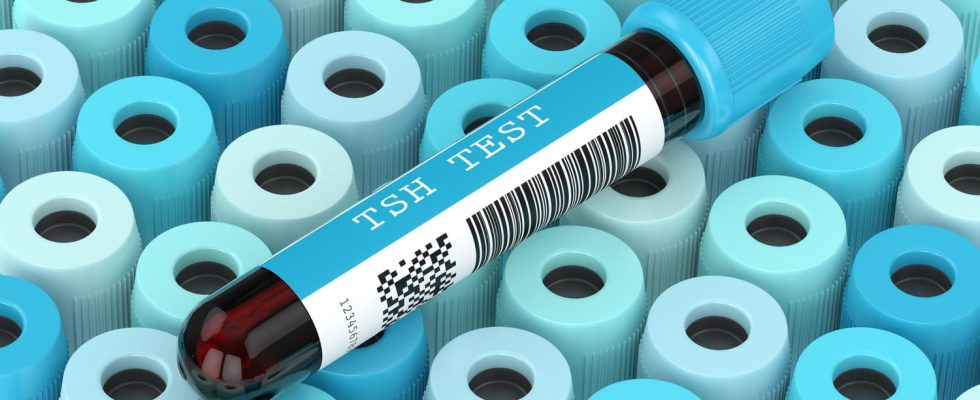Thyroid stimulating hormone (TSH) is the first test requested when a thyroid abnormality is suspected. How to understand the result of his blood test? What is the normal TSH level? Why is it high? Down ?
Thyroid stimulating hormone (or TSH) is a hormone used to control thyroid activity. When one suspects a thyroid disorder (hypothyroidism or hyperthyroidism), it is important to perform a blood test for TSH. To know that thyroid pathologies are more common in women. The incidence of hyperthyroidism in women is around 0.4 to 0.8/1000 per year, whereas in men it is around less than 0.1/1000 per year. What is a low, high or normal TSH? How to easily interpret your blood test results? Our guide.
Definition: what is TSH?
There thyroid stimulating hormone or TSH (thyroid-stimulating hormone), is a hormone secreted by the pituitary glanda small gland located behind the nasal fossae, which has the effect of stimulate the thyroid to secrete the thyroid hormones, T3 and T4, essential for many body functions. The thyroid is a gland located at the base of the neck, in front of the trachea. TSH is the main regulator of the thyroid gland. Thus, the TSH assay remains the reference examination for the assessment of an anomaly of the thyroid. The TSH assay is most often sufficient to detect an anomaly in the functioning of the thyroid. Other examinations are often necessary secondarily:
- a thyroid ultrasound
- blood test for thyroid hormones, T3 and T4.
The hormone thyroxine, also called T4, accounts for approximately 80% of the production of thyroid hormones. This hormone passes into the blood where it largely binds to proteins. The hormone tri-iodothyronine or T3 accounts for 20% of thyroid hormone production.
Should you do a fasting TSH test?
The TSH analysis does not necessarily have to be done on an empty stomach, but it is preferable to do it in the morning to obtain the most significant result.
What is the normal TSH value?
Normal TSH values are between about 0.15 and 5 mIU/l, but they may vary according to the technique used by the medical analysis laboratory. There are physiological changes in the blood level of TSH: for example, it is higher in newborns and falls during the first 3 months of pregnancy.
What does high TSH mean?
A high TSH level is a a sign that the thyroid is not functioning enough and not producing enough thyroid hormones since there is a retro-control of the thyroid on the pituitary. A high TSH level is an early sign of a hypothyroidism. It is common in Hashimoto’s thyroiditis.
What are the symptoms of a high TSH level?
Symptoms of hypothyroidism are variable and unspecific taken in isolation. Symptoms of hypothyroidism include:
- great fatigue,
- pallor,
- weight gain,
- chilliness,
- the appearance of cramps,
- muscle pain,
- constipation
- a puffy face.
What does low TSH mean?
A low TSH level means that the thyroid makes too much thyroid hormone. A decrease in the blood level of TSH most frequently indicates a hyperthyroidism.
What are the symptoms of a low TSH level?
The first symptoms of hyperthyroidism are:
- sometimes rapid and significant weight loss,
- significant nervousness,
- hot flashes
- heart palpitations.
If left untreated, hyperthyroidism can cause serious heart problems. Graves’ disease is an autoimmune disease that causes hyperthyroidism.
What tests to do after a TSH test?
The results of a blood test are never sufficient to make a diagnosis of thyroid disease. A medical consultation is necessary for the interpretation of the results according to the clinical examination, the symptoms found and the questioning. Complementary examinations may then be prescribed.notably an ultrasound and sometimes a thyroid scintigraphy as well as a TSH control. The TSH blood test is also used to monitor treatment for thyroid disease. “Faced with an unusual stressful situation, before resorting to the use of anxiolytics, the search for hyperthyroidism is essential. Unusual weight variations should also encourage the dosage of HRT to avoid drastic and ineffective diets“, specifies Dr Anne-Christine Della Valle, general practitioner.
What treatment for abnormal TSH levels?
hypothyroidism is treated with thyroid hormones whose dosage is adapted to the TSH level as well as the intensity of the symptoms perceived by the subject. In the event of complete surgical removal of the thyroid, these treatments will be continued for life. In the case of Graves’ disease, they can be interrupted after a few months or years. In case of’hyperthyroidismsynthetic anti-thyroid drugs are used, sometimes combined with thyroid hormones to ensure a finer balance.
Thanks to Dr Anne-Christine Della Valle, general practitioner.
